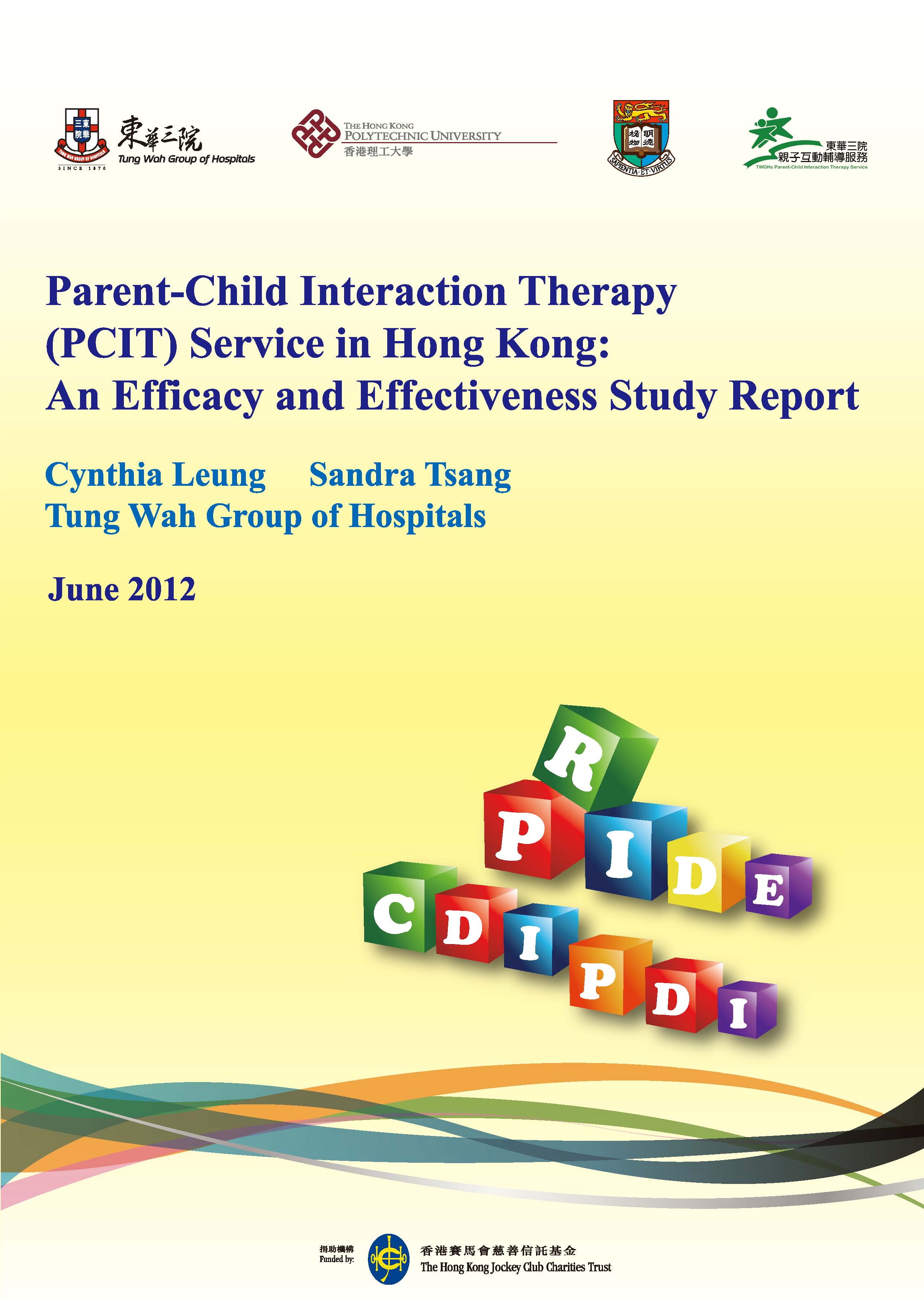
(Download Research Report)
PCIT Research - 2012
Year of Research:
June 2012
Research Title:
Parent - Child Interaction Therapy (PCIT) Service In Hong Kong:An Efficacy and Effectiveness Study Report
Principal Investigators:
Prof. Cynthia Leung and Dr. Sandra Tsang
Executive Summary:
Introduction: This study mainly examined the efficacy and effectiveness of the Parent-Child Interaction Therapy (PCIT) Service of Tung Wah Group of Hospitals (Tung Wah) from November 2008 to October 2011. The program targeted parent-child dyads with children aged 2 to 7 and having behavior problems. The parents were those admitted to be using corporal punishment, at-risk of child abuse, or experiencing high parental stress.
Methods: The program evaluation consisted of two parts. Part A was an efficacy study using a randomized controlled trial (RCT) design involving 111 parent-child dyads randomly assigned to a PCIT intervention group (54 cases) and a wait-list control group(57 cases). Part B was a program effectiveness study involving 604 cases served in the project. Quantitative and qualitative data were collected.
In the efficacy study, the mean age of the target children in the intervention group was 4.57 years, with more boys (70.4%) than girls (29.6%). The behavioral problem of the children as measured by Eyberg Child Behavior Inventory in both the intervention and the wait-list control groups fell within the clinical range. However, there was no significant difference in the demographic characteristics and pre-intervention scores between the two groups.
In the effectiveness study, the mean age of the target children was 4.67 with more boys (70.2%) than girls (29.8%). The majority of the participants (74.7%) were self-referrals. The agency referrals came from Social Welfare Department (12.3%), schools (4.1%), medical settings (3.8%), non-governmental organizations (2.8%) and Tung Wah service units (2.3%).
Results: In the Part A efficacy study,Univariate analysis of covariance (ANCOVA) was used to analyse the data, with group status as independent variable, post-intervention measures as dependent variable, and pre-intervention measures as covariate.The results indicated that after intervention, the intervention group participants, in comparison with the wait-list control group,had significantly lower child behavior problems, parenting stress and negative emotions, and less self-report of use of corporal punishment. There were also significant decreases in inappropriate child management strategies and significant increases in positive parenting practices. The intervention group participants were able to maintain these changes 3 to 6 months after completion of intervention. In the Part B effectiveness study which lasted for three years, 432 of the 604 cases handled by the project completed PCIT treatment successfully, and the overall success rate was 71.5%. Dependent t test was used to analyse the post-intervention and pre-intervention measures of all the 432 successful cases. The results indicated that child behavior problems, parenting stress and use of corporal punishment were consistently lower at post-intervention in comparison with the pre-intervention scores. There were also significant decreases in inappropriate child management strategies, and significant increases in positive parenting practices. There were 418 (96.8%) participants with pre-intervention ECBI-intensity scores above the cut-off (within the clinical range) whose post-intervention scores were below the cut-off. Most of the clients indicated improved parent-child relationship (96.7%), increased confidence in their child discipline abilities (96.6%), and high satisfaction with the PCIT program (99.1%).
Dependent t test was used to analyse the post-intervention and pre-intervention measures of three sub-groups which successfully completed the program: the established child abuse sub-group (n=15), the special educational needs (SEN) sub-group (n=100) and the Attention Deficit/ Hyperactivity Disorder (ADHD)/ ADHD feature sub-group (n=50).The results indicated that child behavior problems, parenting stress and the use of corporal punishment were consistently lower at post-intervention in comparison with those at pre-intervention for all the three sub-groups. Besides, the negative parenting practices had reduced and the positive parenting practices had increased at post-intervention.
"Qualitative results collected from focus groups involving the participants and therapists were consistent with the quantitative data, showing changes in child behavior both at home and in school, and improvement in parent-child relationship and emotions of parents. The parents appreciated the on-the-spot coaching, while the children and the family members were also positive about the program. The therapists attributed the success to the coding and coaching system, and the structured and comprehensive content of the program.
Discussion: The results confirmed that PCIT intervention on a group of parents with children having behavior problems at clinical range had significantly reduced the children's behavior problems, parenting stress and negative emotions, negative parenting practices and use of corporal punishment, and increased positive parenting practices. PCIT was also found to be a promising intervention strategy for established child abuse cases, as well as children with special educational needs, including ADHD. Future studies should include larger samples to examine the differential impact of PCIT on specific user-groups including ADHD, families with domestic violence or mental health history. Longitudinal studies to check the maintenance effect of PCIT should also be considered.


